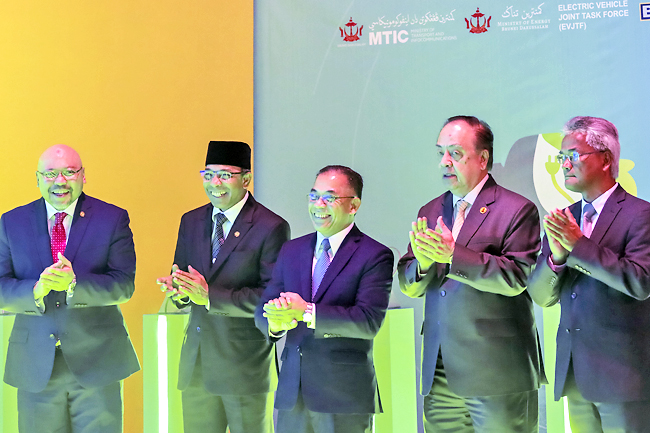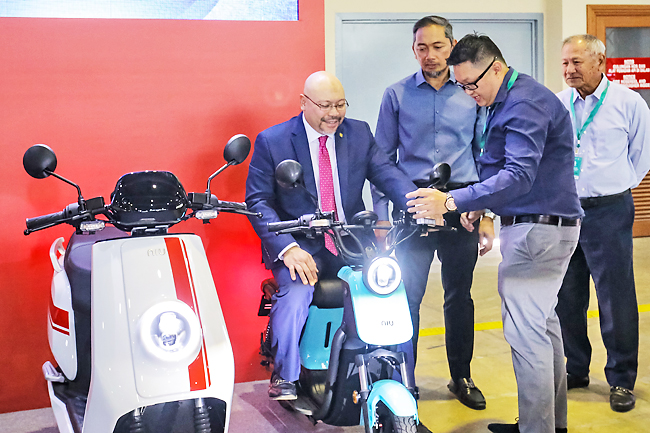Lyna Mohamad
With the consent of His Majesty Sultan Haji Hassanal Bolkiah Mu’izzaddin Waddaulah ibni
Al-Marhum Sultan Omar ‘Ali Saifuddien Sa’adul Khairi Waddien, Sultan and Yang Di-Pertuan of Brunei Darussalam, an initiative has been provided for the duration of the Electric Vehicle (EV) Pilot Project, where vehicle licences (VLs) for any EVs involved or otherwise in the project are exempt from payment until a later establishment of the VL rate for EVs, based on electric motor power.
This was highlighted by Minister of Transport and Infocommunications Dato Seri Setia Awang Abdul Mutalib bin Pehin Orang Kaya Seri Setia Dato Paduka Haji Mohd Yusof during the launch of the EV Pilot Project at the BRIDEX Hall 2 in Jerudong, yesterday.
“I understand that one of the main activities that will be carried out during this pilot project is to identify strategic locations, where charging stations for electric vehicles will be installed in phases and stages, according to the needs of the people in the country,” he said.
The minister also encouraged members of the public to visit the exhibition.
“We very much welcome public feedback for the use of the agencies and companies involved, to assist in the general and comprehensive EV policy review as well as the marketing surveys of the companies involved,” he said.
The EV Pilot Project will involve various stakeholders with the target of making evaluations and studies on the effectiveness of the EV, along with the public’s response, after two years of implementation.


“The policies and programmes have been, and will continue to be reviewed and monitored by an action group which was established since early last year, which is the Electric Vehicle Joint Task Force (EVJTF) led by the Ministry of Energy, said the minister.
“Through a whole-of-nation approach with the involvement of government, non-government agencies and stakeholders, the objective of EVJTF, among others, is to discuss the short and long-term needs for EV implementation, so that the country is better prepared before the widespread deployment of EVs in the country.”
The minister further noted that based on the Brunei Darussalam National Climate Change Policy (BNCCP), which was launched on July 25, 2020, the contribution of carbon emissions from the land transport sector in 2018 was 13.6 per cent, which is the third largest sector in terms of greenhouse gas (GHG) emissions in the country.
“BNCCP has set 10 strategies to pave the way for the country’s resilience in climate change and low carbon emissions. EV is the third strategy, with the target of increasing EV shares to 60 per cent of the total vehicle sales in this country by 2035.
“The annual average number of new vehicle registrations in the country for the past five years is 12,658 vehicles per year; and by 2035, based on EVJTF’s preliminary study with the Brunei Climate Change Secretariat (BCCS), an estimated 11,400 new vehicles will be registered of which 60 per cent or 6,800 are targetted to be electric vehicles by 2035.
“Towards achieving this target, the preparation of policies and programmes to promote EV ownership including incentives, provision of infrastructure, customer protection, capacity building programmes including retraining and upskilling, emergency response, waste disposal and continuous provision are being worked on and planned for implementation under the role of EVJTF; and this is done together with industry players and other stakeholders,” he said.
Meanwhile, at the EV Pilot Project Symposium, Head of the Brunei Climate Change Secretariat Noor Dina Zharina binti Haji Yahya said that the projects (RKN 2015-2020) to address the impact of climate change impact on the country have cost the government BND68.2 million.
“Although Brunei is among the lowest contributor of green house gasses, at 0.025 per cent, we are also feeling the impact of climate change and it will become worse in the future. If we don’t take any mitigation measures, our temperature will increase up to four degrees Celsius to 35 degrees Celsius daily, by 2100,” she said.
The three-day symposium features the involvement of ministries and government departments, as well as non-government organisations (NGOs) and private sector.
Two speakers from Singapore and Malaysia have been invited to share their best practices through a virtual medium.